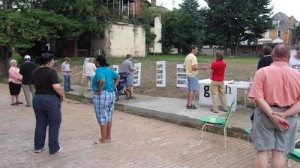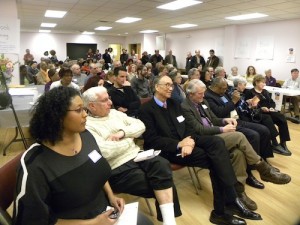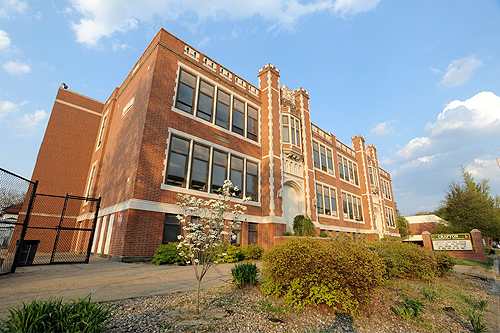
Category Archive: PHLF News
-
PHLF Receives Major Geographical Information Systems Grant
PHLF News
February 28, 2010The Environmental Systems Research Institute (Esri), base in Redlands, California, approved a software grant for mission-related work of specialized GIS software, ArcInfo, to the Pittsburgh History & Landmarks Foundation that has a valued at $160,000. The award was announced February 25.
“PHLF does a significant amount of work in historic and urban inner-city neighborhoods,”, said Landmarks Chief Information Officer Ronald C. Yochum, Jr., “and understanding the raw data we collect via sophisticated mapping technology helps us better visualize and achieve our goals of successful and sustainable neighborhood revitalization.”
PHLF has been using a version of ESRIs ArcView GIS software to produce maps for our efforts in Wilkinsburg, PA., however we wanted to expand the level of spatial analysis of the raw data, so Mr. Yochum approached Esri and applied for their Non-profit Organization program.
Landmarks will be using Esri’s ArcInfo GIS software for an upcoming quantitative analysis of PHLF activities over the history of the company and will be developing maps of the regions historic assets. The software will also help support staff projects in our education, neighborhood development, Main Street and Elm Street programs, and other bricks and mortar projects.
Esri offers a variety of programs to support groups working for social and environmental benefit. Organizations use GIS to analyze complex situations, visualize problems, and create plans and solutions, as well as increasing efficiency, reducing costs, and helping people make faster and better decisions. More information on this software can be found at www.esri.com.
-
PHLF Wins Allegheny County Grant for Community Garden Project
An urban farming and community garden project that started as a part of PHLF’s vacant lot reuse initiative in Wilkinsburg was one of three recipients of a $20,000 grant from Allegheny County in February. The funds will help residents of Hamnett Place a National Register-listed historic district cover implementation costs, including the purchase of gardening tools and materials, seedlings, and technical expertise over a two-year period. Currently, PHLF is in partnership with the non-profit social enterprise Growth Through Energy and Community Health (GTECH Strategies) to help the community craft a site map of the garden on a 19,000 square-foot lot at 502-504 Jeanette Street.

-
Now Available: August Wilson: Pittsburgh Places in His Life and Plays
 More than 200 people attended the book-signing celebration hosted by the Pittsburgh History & Landmarks Foundation, Historic Hill Institute, and Hill Community Development Corporation on Saturday, February 26 at Ebenezer Baptist Church in Pittsburgh’s Hill District. “This guidebook to places associated with playwright August Wilson’s life and work is the result of the cooperative efforts of many people,” said Louise Sturgess, executive director of Landmarks, “and its power is not to be underestimated in terms of its substance and impact.”
More than 200 people attended the book-signing celebration hosted by the Pittsburgh History & Landmarks Foundation, Historic Hill Institute, and Hill Community Development Corporation on Saturday, February 26 at Ebenezer Baptist Church in Pittsburgh’s Hill District. “This guidebook to places associated with playwright August Wilson’s life and work is the result of the cooperative efforts of many people,” said Louise Sturgess, executive director of Landmarks, “and its power is not to be underestimated in terms of its substance and impact.”Lead donors Kenya Boswell from BNY Mellon Foundation of Southwestern Pennsylvania and Gerry Kuncio of the Pennsylvania Historical and Museum Commission offered brief remarks, along with the authors Laurence A. Glasco, Christopher Rawson, Kimberly C. Ellis, and Sala Udin. The authors and PHLF presented complimentary books to high schools, colleges, and libraries in the city and county.
The guidebook was supported by a Preserve America grant from the National Park Service, administered under the Preserving African American Heritage in Pennsylvania program of the Pennsylvania Historical and Museum Commission. The Multicultural Arts Initiative and 75 PHLF members and friends also contributed to the guidebook.
August Wilson is one of America’s great playwrights. He lived in Pittsburgh from his birth in 1945 to 1978, when he moved to St. Paul, MN, and later to Seattle, WA. He died in 2005 and is buried in Pittsburgh. Wilson composed 10 plays chronicling the African American experience in each decade of the twentieth century––and he set nine of those plays in Pittsburgh’s Hill District. He turned the history of a place into great theater.
“It’s very exciting to be part of an excellent project that results in a resource that will help make Wilson’s life and work more accessible to the public, become the basis for public tours, and encourage people to care for and preserve the Pittsburgh places connected with the African American playwright,” said Gerry Kuncio.
To order a book ($8.95 plus sales tax), click here.
-
Historic Religious Properties and New Members Reception: March 2
The Historic Religious Properties Committee awarded $78,600 in 14 grants and five Technical Assistance awards to congregations in Pittsburgh and Allegheny County. An Awards Reception will be held from 3 to 3:45 pm in the Grand Concourse Restaurant Board Room on March 2. George Dorman, chairman of the HRP Committee, and PHLF Board Chairman Mark Bibro will give brief remarks.
Immediately following, from 3:45 to 5:00 pm award recipients and new PHLF members will be invited to tour PHLF offices and libraries on the fourth floor of The Landmarks Building at Station Square.
Congratulations to the following grant recipients:
- Congregation Poale Zedeck, Squirrel Hill, for brick pointing and masonry repairs.
- First Presbyterian Church of Edgewood, for refinishing of exterior doors.
- First Presbyterian Church of Pittsburgh, Downtown, for refinishing of exterior doors.
- First Trinity Evangelical Church, Oakland, for repairing box gutters and replacing missing slates.
- Mt. Lebanon Presbyterian Church, stained glass window restoration.
- Pittsburgh Mennonite Church, Swissvale, for brick pointing.
- Sacred Heart Church, Shadyside, for stained glass window restoration
- South Side Presbyterian Church, for replacement of main roof.
- Stewart Avenue Evangelical Lutheran Church, for brick pointing and masonry work.
- St. Nicholas Catholic Church, Millvale, for repair and repainting of the exterior woodwork on the main structure of the church.
- St. Paul Baptist Church, Pt. Breeze, for box gutter relining and replacing missing slates.
- Waverly Presbyterian Church, Regent Square, for masonry repairs on main entrance stairway area.
- The Byzantine Seminary, in Perry Hilltop, received a grant from The Kim and Miller Family Fund at PHLF, payable over a four-year period, to help with repairs.
- Calvary United Methodist Church, in Allegheny West, received a grant from the Barensfield Fund at PHLF, to help with its handicapped-ramp project.
In addition, this year’s Barensfeld Fund Grant, of $1,100 was awarded to Calvary United Methodist Church in Allegheny West, to go toward the church’s handicapped ramp project.
The following received Technical Assistance Awards:
- Bethesda Presbyterian Church, Homewood
- Brown AME Chapel, Central North Side
- Ethnan Temple Seventh Day Adventist Church, Wilkinsburg
- Greenfield Presbyterian Church, Greenfield
- Jesus’ Dwelling Place, North Braddock
-
New President Named for Landmarks Community Capital Corporation.
Pittsburgh— We are pleased to announce that Michael Sriprasert, director of Real Estate Development, for the Pittsburgh History & Landmarks Foundation has also been named President of Landmarks Community Capital Corporation. This subsidiary was created in 2007 to undertake various forms of community revitalization activity. Since then, LCC has been repositioned as the lending arm of PHLF and will house all the loan funds, which serve non-profit and for-profit organizations.
Sriprasert, 30, who joined the PHLF staff five years ago, has been active in assisting the Board in this new focus. Under his leadership, LCC has applied for designation as a Community Development Financial Institution from the United States Treasury Department and received a grant from Treasury to help formulate the program.
“I am very excited at the opportunities LCC has to expand lending for preservation related projects in Pittsburgh and beyond. We will be focusing our efforts on increasing the pipeline of deals and raising additional capital for lending,” said Sriprasert.
Significant initial capital to launch LCC was provided by the Sarah Scaife and Allegheny Foundations, charities of Richard M. Scaife.
A graduate of Kenyon College, and Carnegie Mellon University’s Heinz College of Public Policy and Management, Sriprasert is also a 2011 candidate for the Master’s of Business Administration degree at CMU’s Tepper School of Business.
-
Book-Signing & Celebration: August Wilson: Pittsburgh Places in His Life and Plays
The Pittsburgh History & Landmarks Foundation (PHLF), Historic Hill Institute, and Hill Community Development Corporation are hosting a free public event on Saturday, February 26, 2011 at Ebenezer Baptist Church, 2001 Wylie Avenue, in Pittsburgh’s Hill District. The public is invited any time between 1:00 and 3:00 p.m. to celebrate the publication of a 166-page guidebook, August Wilson: Pittsburgh Places in His Life and Plays, by Laurence A. Glasco and Christopher Rawson, with introductions by Kimberly C. Ellis and Sala Udin. RSVP (required by February 22): marylu@phlf.org or 412-471-5808, ext. 527.
At 2:00 p.m., the authors will present brief remarks (see page 3 for brief bios of the authors). Representatives from BNY Mellon Foundation of Southwestern Pennsylvania and the Pennsylvania Historical and Museum Commission, lead donors, will present complimentary copies to high schools and libraries in the city and county. The guidebook research, writing, design, and printing were supported by a Preserve America grant from the National Park Service, administered under the Preserving African American Heritage in Pennsylvania program of the Pennsylvania Historical and Museum Commission. The Multicultural Arts Initiative and 75 PHLF members and friends also contributed to the guidebook.
August Wilson is one of America’s great playwrights. He lived in Pittsburgh from his birth in 1945 to 1978, when he moved to St. Paul, MN, and later to Seattle, WA. He died in 2005 and is buried in Pittsburgh. Wilson composed 10 plays chronicling the African American experience in each decade of the twentieth century––and he set nine of those plays in Pittsburgh’s Hill District. He turned the history of a place into great theater. His plays, including Fences, The Piano Lesson, Two Trains Running, Jitney, Gem of the Ocean, and Radio Golf have become classics of the American stage.
August Wilson: Pittsburgh Places in His Life and Plays guides visitors to key sites in the playwright’s life and work in the Hill District and elsewhere in the Pittsburgh area. The guidebook enriches the understanding of those who have seen or read his plays, inspires others to do so, and educates all to the importance of respecting, caring for, and preserving the Pittsburgh places that shaped, challenged, and nurtured August Wilson’s rich, creative legacy.
Contents of August Wilson: Pittsburgh Places in His Life and Plays, by Laurence A. Glasco and Christopher Rawson, include:
- Introductions by Kimberly C. Ellis and Sala Udin;
- Essays on the life and work of August Wilson and on Pittsburgh’s Hill District;
- A guide to 45 places in the Pittsburgh area associated with Wilson’s life and plays;
- Summaries of the 10 plays in Wilson’s Pittsburgh Cycle and a bibliography.
Book Specifications:
- 166 pages, soft cover; 5? x 8?
- 104 photos and maps (mostly color)
- ISBN 978-0-9788284-7-9
- Price: $8.95
- Trade discount available
This is the fourth in a series of guidebooks published by PHLF. Other guidebooks feature H. H. Richardson’s Allegheny County Courthouse, Downtown Pittsburgh, and Connick stained glass. To order books: www.phlf.org click on STORE. Or: frank@phlf.org; 412-471-5808, ext. 525.
Founded in 1964 and recognized as one of the nation’s most innovative and effective nonprofit historic preservation organizations, the Pittsburgh History & Landmarks Foundation (PHLF) works to: identify and save historically significant places; revitalize historic neighborhoods, towns, and urban areas; preserve historic farms and historic designed landscapes; and educate people about the Pittsburgh region’s rich architectural heritage.
(1) The activity that is the subject of this guidebook has been financed in part with Federal funds from the National Park Service, U.S. Department of the Interior. However, the contents and opinions do not necessarily reflect the views or policies of the Department of the Interior, nor does the mention of trade names or commercial products constitute endorsement or recommendation by the Department of Interior.
(2) This program receives Federal financial assistance for identification and protection of historic properties. Under Title VI of the Civil Rights Act of 1964, Section 504 of the Rehabilitation Act of 1973, and the Age Discrimination Act of 1975, as amended, the U.S. Department of the Interior prohibits discrimination on the basis of race, color, national origin, disability or age in its federally assisted programs. If you believe you have been discriminated against in any program, activity, or facility as described above, or if you desire further information, please write to: Office of Equal Opportunity, National Park Service, 1849 C Street, N.W., Washington, D.C. 20240.
About the Authors
August Wilson: Pittsburgh Places in His Life and Plays
by Laurence A. Glasco and Christopher Rawson
Published by Pittsburgh History & Landmarks Foundation, 2011
Laurence A. Glasco, associate professor of history of the University of Pittsburgh, has a PhD in Afro-American and Ethnic History and has taught at the University since 1969 in those areas, as well as in Quantitative and Urban History. His essay, “Double Burden: The Black Experience in Pittsburgh,” published in City at the Point in 1989, was the first comprehensive survey of black history in this region. A trustee of the Pittsburgh History & Landmarks Foundation and noted author and speaker, Glasco leads tours of Pittsburgh’s Hill District and interviews Hill residents on a regular basis in his ongoing efforts to research, document, and interpret the significance of the Hill.
Christopher Rawson, a member of the University of Pittsburgh English Department since 1968, has a PhD in English Literature and teaches satire, criticism, August Wilson, and Shakespeare. Rawson is also senior theater critic for the Pittsburgh Post-Gazette (PPG) and has twice been the chair of the American Theatre Critics Association. As the PPG’s full-time theater critic and theater editor from 1983 to 2008, he chronicled Wilson’s career in detail, starting with his Broadway debut in 1984, and compiled a comprehensive record of reviews, interviews, and news stories about his work. He was the first to suggest in print Hill District locations for Wilson’s plays.
Introductions by Kimberly C. Ellis and Sala Udin
Dr. Kimberly C. Ellis is a scholar of American Studies and African American Literature and History. She taught the first seminar course on August Wilson at the University of Pittsburgh, is the founder of AW-L, a listserv celebrating the life, literature, and legacy of August Wilson and is publishing a Teacher Training Workbook entitled “August Wilson for Young Minds,” for educational use in the schools, which can easily accompany PHLF’s guidebook. Dr. Ellis is also Executive Director of the Historic Hill Institute, which provides August Wilson Tours and much more. To schedule tours, please visit: http://historichill.org/tours
Sala Udin, born and raised in Pittsburgh’s Hill District, grew up with August Wilson and established the Black Horizon Theater with Wilson and others in 1968. Sala is well known to Pittsburgh audiences for his performances in August Wilson’s plays. He played the lead in Jitney, performed by Pittsburgh Playwrights Theatre Company in 2010, and he recently read the part of Cutler in Ma Rainey’s Black Bottom at the August Wilson Center for African American Culture. Sala served in Pittsburgh’s City Council from 1995 to 2006. Recognized for his extensive community experience and leadership, Sala is on a number of boards and is President and CEO of the Coro Center for Civic Leadership in Pittsburgh.
-
Praise for PHLF Educational Programs
A Sampling of Comments from the Pittsburgh History & Landmarks Foundation 2010 Education Report
Compiled by interns Allison Ake (Duquesne University) and Lizzy Stoyle (University of Pittsburgh)
“We both agreed that it’s a fabulous program and a perfect enhancement to the 3rd grade Pittsburgh social studies curriculum.” [“Building Pride Building Character Trolley Tour”] Alea Melacrinos, Banksville Elementary School, February 19, 2010.
“Going on these tours makes one feel more connected to the city!” [Free Friday Walking Tours] Susan Karas, April 13, 2010
“Our guide was excellent, catered to everyone in the tour group, and full of useful information. It enhanced my appreciation of Pittsburgh.” [Grant Street and More Tour] Matthew Kessler, May 10, 2010
“That was the best field trip I ever went on and probably the best one I will ever go on.” [“Building Pride Building Character Trolley Tour”] Jimmy L., Pittsburgh Minadeo Student, May 20, 2010
“The guide was very informative and friendly. Thank you for all you and your team do to promote this wonderful city.” [Friday Grant Street Tour] John Kanik, May 24, 2010
“Well-organized, thorough descriptions of our city’s history, student-friendly and fun, knowledgeable educators/docents guiding the trip. Students are able to ride a trolley and visit places they may never have the opportunity to visit!” [“Building Pride Building Character Trolley Tour”] Anonymous Teacher
“Now I don’t call something an “old building.” I say, “Look at the potential that historical building has.” [Westmoreland Design Challenge] Anonymous Student
“A magical blend of history and architecture – the students were in awe!” [Downtown Dragons Tour] Anonymous Teacher, Summer 2010
“Loved by both kids and parents, and extremely educationally valuable.” [Downtown Dragons Tour] Anonymous Teacher, Summer 2010
“I feel that I learned a lot about involving the community in the history, preservation, and arts of our city.” Loraine Ziegler, former intern, August 3, 2010
“PHLF seems like a prefect partner to help underscore the relevance of history!” [CMU Prize in Architectural History] Kai Gutschow, M.Arch/PhD CMU School of Architecture, August 24, 2010
“I may not be the first scholarship recipient to achieve this goal, nor do all go into architecture, but I thought you’d like to know that what began so many years ago as a simple $4,000 scholarship helped me get to where I am today.” [He is a fully-registered practicing architect.] Steven Albert, August 27, 2010
“What he learned is going to make him appreciate his Downtown office environs a lot more.” [Fourth Avenue & Grant Street Tour] Violet Law, September 11, 2010
“This was my first time to Pittsburgh… such a great way to start my visit.” [Car Free Saturday-South Side Tour] Trisha Knueven, October 23, 2010
“Thank you very much for taking your time and providing my students with a trip that really held their interest.” [Downtown Dragons Tour] Mary Beth Veri, Carlynton School District, October 21, 2010
“Every year, I learn something new.” [Urban Survival Tour] Anonymous, Gateway High School, October 27, 2010
“It was so well organized and I felt that the kids were safe and engaged the entire time.” [Urban Survival Tour] Anonymous, Winchester-Thurston, September 20, 2010
-
Historic Crafton Elementary School Threatened with Closure
PHLF News
January 28, 2011In 2010, the Carlynton School District conducted a district-wide facilities-use study on renovating or replacing its two elementary schools: the Carnegie Elementary School and the Crafton Elementary School.
The Crafton Elementary School, built in 1913 and designed by architect Press C. Dowler, is a handsome Tudor-style building located at 1874 Crafton Blvd, a lovely residential neighborhood of Crafton Borough. The school is threatened with closure and ultimate abandonment in one of the options being considered.
Included in the Pennsylvania Historical and Museum Commission Architectural Survey of Historic Resources, the building has served as a community focal point for nearly a century and was one of the deciding criteria in selecting Crafton as the best place to raise children in Pennsylvania by Bloomberg BusinessWeek. The Crafton Elementary School is made of hand-burned brick laid in Flemish bond and has two projecting bays with crenelated tower projections, giving the building a stately appearance.

Crafton Councilwoman April Weitzel called the building a “gem of the community that has served and will continue to serve the citizens of Crafton and Carnegie.” Councilwoman Weitzel is convinced that renovating the school will be less expensive, resulting in no tax increases for the district. She further stated that “maintaining our neighborhood schools instead of abandoning them helps stabilize property values and encourages others to move into Carnegie and Crafton.”
Pittsburgh History & Landmarks Foundation would like to see this building continue being used as a school and has expressed its concern about possible closure of this important community asset. Renovation of historic schools is often less expensive than new construction. Restoration supports “green” policy and helps stabilize historic neighborhoods. This issue is scheduled to be discussed at the next School Board meeting. Comments can be sent to:
Carlynton School District
435 Kings Highway
Carnegie PA 15106
Click for MapBoard Meeting: Thursday, February 3, 2011 at 7:00 p.m. in the High School Cafeteria
and
Board Meeting: Thursday, February 17, 2011 at 7:30 p.m. in the High School Cafeteria

